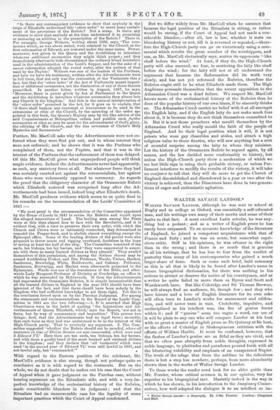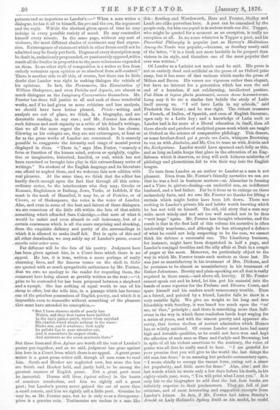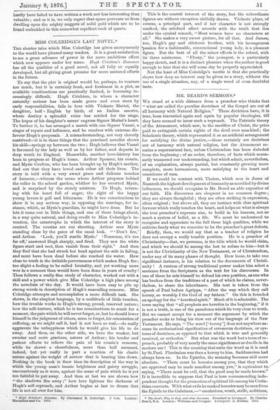WALTER SAVAGE LANDOR.* WALTER SAVAGE LANDOR, although he was sent
to school at Rugby and to college at Oxford, was essentially a self-educated man, and his writings owe many of their merits and some of their faults to that fact. A most excellent Latin scholar, he was any- thing but a pedant ; and as a writer of English prose he has rarely been surpassed. To an accurate knowledge of the literature of England, he joined a competent acquaintance with that of France and Italy ; and he was an acute, but somewhat capri- cious critic. Stiff in his opinions, he was oftener in the right than in the wrong ; and there is so much that is genuine in all his writings, that he has less to fear from the verdict of posterity than many of his contemporaries who gained a much larger share of fame. Such or some such brief, bald summary as this is all that is likely to be found after Landor's name in future biographical dictionaries, for there was nothing in his actions to attract or deserve the notice of his countrymen, and as a writer he quite failed to move them as Byron and Scott and Wordsworth have. But like Coleridge and Sir Thomas Browne, he will always find an audience, fit, though few ; and they who have leisure and a love of English literature for its own sake will often turn to Landor's works for amusement and edifica- tion, and will never turn in vain. Crotchetty, impulsive, and undisciplined as his intellect was, the fire of genius burnt within it; and if " genius " seem too vague a word, our use of it will be plain to any one who will compare Lander at his best with so great a master of English prose as De Quincey at his best, or the efforts of Coleridge in Shakespearean criticism with the efforts of William Hazlitt. It must be confessed, however, that the flashes of Landor's genius are as fitful as they are vivid, and that we often pass abruptly from noble thoughts, expressed in noble language, to platitudes and paradoxes poured forth with all the blustering volubility and emphasis of an exasperated Napier. The truth of the adage that from the sublime to the ridiculous there is but a step has nowhere, perhaps, been more abundantly shown than in the works of Walter Savage Landor.
To these works the reader need look for no abler guide than Mr. Forster, whose critical acumen is, in our opinion, very far superior to his biographical tact. Masterly indeed is the way in which he has shown, in his introduction to the Imaginary Conver- sations, how well adapted the dialogue is to an intellect so im- • Walter Swage Lander: a Btography. By John Forster. London: Chapman and Hall. petuous and so imperious as Landor's :—" When a man writes a dialogue, he has it all to himself, the pro and the con, the argument and the reply. Within the shortest given space of time he may indulge in every possible variety of mood. He may contradict himself every minate. In the same page, without any sort of violence, the most different shades of sentiment may And expres- sion. Extravagance of statement which in other forms could not be admitted may be freely put forth. Dogmas of every description may be dealt in, audaciously propounded, or passionately opposed,with a
result all the livelier in proportion to the, mere vehemence expended on ,them. In no other style of composition is a writer so free from orderly restraints upon opinion or so absolved from self-control."
There, is another aide to all this, of course, but there can be little doubt that Landor was right in making dialogue the vehicle of his opinions. In fact, the Pentameron, the Examination of William Shakspeare, and even Pericles and Aspasia, are almost, as much dialogues as the Imaginary Conversations themselves. Mr. Forster has done full justice to all and each of these wonderful works, and if he had given us more criticism and less analysis, we should have been better pleased. Précis-writing and
analysis are out of place, we think, in a biography, and are detestable reading, in any case; and Mr. Forster has shown such fairness and such capacity as a critic of his friend's writings, that we all the more regret the course which he has chosen. Glowing as his eulogies are, they are not extravagant, at least so far as the prose works of Landor are concerned. It is scarcely possible to, exaggerate the intensity and range of mental power
displayed in them. "There is," says Mrs. Foster, "scarcely a form or function of the human mind, serious or sprightly, cogita- tive or imaginative, historical, fanciful, or real, which has not been exercised or brought into play. in this extraordinary series of
writings." No student of the English language and its literature can afford to neglect them, and we welcome this new edition with real pleasure. At the same time, we think that the editor has hardly dwelt enough upon the fact that through all this extra- ordinary series, be the interlocutors who they may, Greeks or Romans, Englishmen or Italians, Jews, Turks, or Infidels, if the mask is the mask of Hannibal, it may be, or of Pericles, or of Cicero, or of Shakespeare, the voice is the voice of Landor. Also, and even in some of the best and fairest of these dialogues, we are conscious of the little rift within the lute of that subtle something which offended Sara Coleridge,—that note of what it would be unfair and even absurd to call indecency, but of a certain coarseness which is all the more surprising and shocking,
from the exquisite delicacy and purity of the surroundings in which it is allowed to make itself felt. But in spite of this and all other drawbacks, we may safely say of Landor's prose, crescet occult° velut arbor acre.
Far different will be the fate of his poetry. Judgment here has been given against him, in a Court from which there is no
appeal. He has, it is true, written a score perhaps of really charming lines, and the famous verses on the shell in Gebir
are quoted with so much sympathetic enthusiasm by Mr. Forster, that we owe no apology to the reader for requoting them, the comment here being almost as prettily written as the text : —"A prize to be contended for has been proposed between a shepherd and a nymph. She has nothing of equal worth to one of his sheep to offer, but she tells him, in a passage which has become
one of the priceless possessions of English poetry, and which it is impossible even, to transcribe without something of the pleasure that must have attended its conception,— "But I have sinuous shells of pearly hue Within, and they that lustre have imbibed In the son's palace-porch, where when unyoked
His chariot-wheel stands midway in the wave:
Shako one, and it awakens; then apply Its polisht lips to your attentive ear, And it remembers its august abode, And murmurs as the ocean murmurs there."
But these lines and Bose Aylmer are worth all the rest of Landor's poetry put together, and as we said, judgment has gone against
him here in a Court from which there is no appeal. A great prose writer is a great prose writer still, though all men cease to read him. South and Hooker are neglected now, but none the less are South and Hooker held, and justly held, to be among the greatest masters of English prose. But a great poet must
be immortal. Horace still lives (spirat adhuc) in the hearts of numbers numberless, and him we rightly call a great
poet; but Landor's poetry never gained the car of more than a small coterie, and him we rightly call a little poet. -Genuine he - may be, as Mr. Forster says, but he is only so as a threepenny-
piece is a genuine coin. Testimonies are useless in a case like this : Southey and Wordsworth, Hare and Forster, Shelley and Lamb are alike powerless here. A poet can be canonised by the people only, for him vox populi is in serious truth vox Del. Tupper, who might be quoted for a moment as an exception, is really no exception at all. In no sense whatever is Tupper a poet, and his Proverbial Philosophy is popular just as Hervey's Meditations Among the Tombs was popular,—because, as Southey neatly said of the latter, "it is a book not more laudable in its purport than vicious in its style, and therefore one of the most popular that ever was written."
Of Landor as a Latinist not much need be said. His prose is not so entirely dead and artificial as the prose of an Oxford prize essay, but it has none of that raciness which marks the prose of Milton and Bacon. His verses are vigorous rather than elegant, but have no interest for a generation which has seen the sad end of a harmless, if not exhilarating, intellectual pastime. Fuit Ilium et in gear gloria pentametri, necnon d.ecus hexametrorum. Long may it be ere a similar fate befalls the study of Latin itself among us. "I will have Latin in my schools," said Frederick the Great ; and he was right. The richest treasures of French, of Italian, of Spanish, and even of English literature, open only to a Latin key ; and a knowledge of Latin such as Landor had is far more of a liberal education in itself, than all those shreds and patches of analytical guess-work which are taught at Oxford as the science of comparative philology. This demon, or some brother-fiend qui a perdu son Latin, whispers Browning to vex us with 4ischuies, and Mr. Cox to tease us with Boiotia and the Korkyraians. Landor would have spurned such folly as this, and, as long as Latin keeps that place in the education of an Eng- lishman which it deserves, so long will such hideous misbirths of philology and phoneticism fail to win their way into the English tongue.
To turn from Landor as an author to Landor as a man is not pleasant. Even from Mr. Forster's friendly narrative we can see that he was a fool in business matters—an Alnaschar in farming and a Visto in picture-dealing--an undutiful son, an indifferent husband, and a bad father. Far be it from us to enlarge on these melancholy facts, and we owe Mr. Forster no thanks for lifting a curtain which might better have been left down. There was nothing in Landor's private life and habits worth knowing which he has not told us himself. The old, old story that a man may write most wisely and not act too well needed not to be thus "writ large" again. Mr. Forster has thought otherwise, and the result is that in the first half of this volume his narrative is often intolerably wearisome, and although he has attempted a defence of what he could not help suspecting to be the case, we cannot think his defence a successful one. The Llanthony business, for instance, might have been despatched in half a page, and Landor's conjugal troubles and the silly affair at Bath in a couple of pages e the most. Moreover, we particularly object to the way in which Mr. Forster treats such matters as these last. He was just as unsatisfactory in his treatment of Mrs. Dickens, and be promises to be almost as unsatisfactory in his treatment of Esther Johnstone. Brevity and plain-speaking are all that is really required in these cases—and above all, brevity. If Mr. Forster cannot speak out and be brief, let him put his material into the hands of some reporter for the Probate and Divorce Court, and spare himself and his readers much unnecessary trouble. Even as a friend, and painted by a friend, Landor fails to show in a very amiable light. We give no weight to his long and true friendship with Southey, it was based too much upon the "Ca' me, ca' thee," principle ; and there is something more than ludi- crous in the way in which these readerless bards kept waging for a series of years, and with the utmost gravity and apparent sin- cerity, that len turn duel/urn of mutual admiration which Horace has so wittily satirised. Of course Landor must have had many high and loveable qualities, or he could not have won and kept the affection of such men as Hare and Carlyle and Browning, but in spite of all his violent assertions to the contrary, the voice of praise was all that he really cared to hear. "I am grateful for your promise that you will give to the world the last things the old man has done," is an amusing but pathetic commentary upon, "I wrote chiefly to occupy the vacant hour, caring not a straw for popularity, and little more for fame." Alas, alas ! and the last words which he wrote only a few days before his death, in his eighty-ninth year, were, "You will print what I sent you." It is only fair to the biographer to add that the last four books are infinitely superior to their predecessors. They are full of just criticism, and of most interesting and suggestive excerpts from Landor's letters. In fact, if Mr. Forster had taken Stanley's Arnold or Lady Holland's Sydney Smith as his model, he could
hardly have failed to have written a work not leas interesting than valuable ; and as it is, we only regret that space prevents us from dwelling upon the mighty nuggets of solid gold which are to be found embedded in this somewhat repellent rock of quartz.




































 Previous page
Previous page